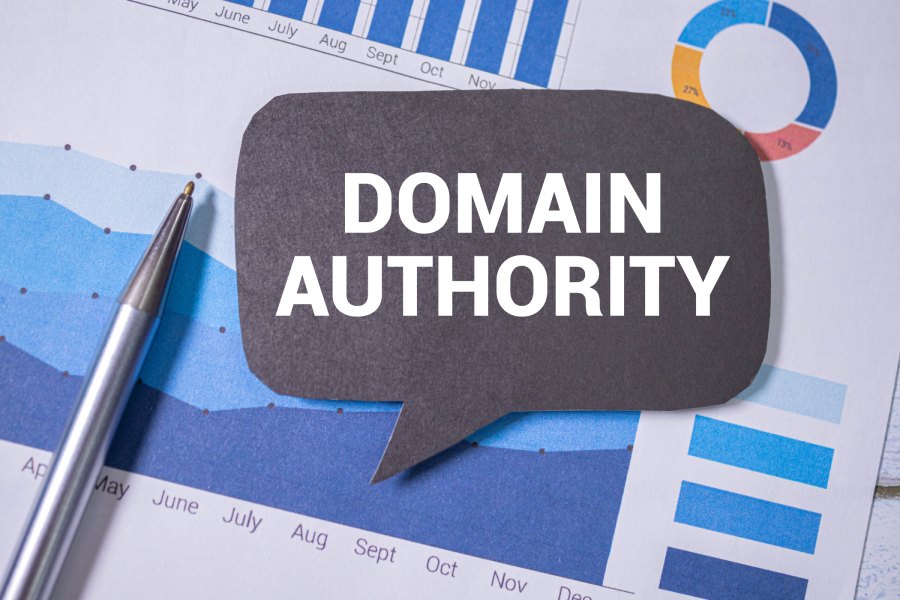In the ever-evolving landscape of digital marketing and search engine optimization, professionals are constantly seeking ways to measure and improve their online presence. Among the myriad of metrics and tools available, one term that frequently surfaces is Domain Authority.
This concept, introduced by Moz, has become a cornerstone in evaluating a website’s potential to rank in search engine results pages. But what is domain authority, and what does it tell us?
In today’s competitive digital landscape, understanding the intricacies of Domain Authority has become essential for businesses and content creators seeking to establish their online presence.
For SEO veterans and digital marketing newcomers alike, understanding this metric offers crucial insights into website performance and positioning. In this article, we’ll dive into the intricacies of Domain Authority, exploring its origins, components, and impact on your digital strategy.

What Is Domain Authority?
Domain Authority, commonly abbreviated as DA, is a proprietary ranking metric developed by Moz, a leading SEO software company. This score is designed to predict how well a website is likely to rank on search engine result pages (SERPs). DA operates on a logarithmic scale from 1 to 100, with higher scores indicating a greater ability to rank.
Domain Authority serves as a comparative measurement of a website’s SEO strength. It takes into account multiple factors, including linking root domains and the number of total links, to calculate a single score. This score allows webmasters and SEO professionals to gauge their site’s potential performance against competitors and track their SEO progress over time.
How Domain Authority Is Calculated
Factors influencing Domain Authority
Domain Authority (DA) considers various elements of a website’s performance and reputation. The calculation takes into account the quality and quantity of backlinks pointing to the domain. Internal site structure, including content organization and interlinking, also plays a crucial role.
Overall SEO performance contributes significantly to the DA score. This includes factors like site speed, mobile-friendliness, and content relevance. Search engines assess these elements to gauge a website’s user experience and relevance.
The age of the domain and its historical performance in search rankings can impact DA. While these factors influence DA, the exact algorithm used by tools like Moz is proprietary and subject to updates.
The domain authority score range
As mentioned above, Domain Authority is expressed as a numerical score ranging from 1 to 100. Higher scores indicate greater potential for ranking well in search engine results pages (SERPs).
A score of 1 represents a new or poorly optimized website, while 100 is typically reserved for major websites. Most websites fall somewhere in the middle of this range. Scores between 20 and 60 are common for small to medium-sized businesses or personal websites.
DA is a comparative metric, most useful when comparing your site to direct competitors. Improving DA is generally a gradual process requiring consistent effort across various SEO aspects. As a website accumulates quality backlinks and enhances its SEO, its DA score is likely to increase. Remember, DA is just one of many metrics used to assess a website’s overall SEO health.
Why Domain Authority Matters
Impact on search engine rankings
Domain Authority (DA) is a crucial metric for predicting a website’s performance in search results. A higher DA score generally correlates with better rankings for targeted keywords. This improved positioning can significantly boost a site’s visibility to potential visitors.
Websites with higher DA often appear more frequently on the first page of search results. This prominent placement increases the likelihood of attracting clicks from users. As a result, high-DA sites typically enjoy a larger share of organic search traffic.
It’s important to note that while DA strongly influences rankings, it’s not the only factor. Search engines consider numerous elements, such as content quality, keywords, backlinks, and UX, when determining page rankings for specific queries.
Competitive analysis and benchmarking
DA serves as a valuable tool for comparing your website’s potential against competitors. By evaluating your DA alongside that of similar sites in your niche, you can gauge your relative strength. This comparison helps identify areas where you may need to improve your SEO efforts.
Regularly monitoring your DA and that of your competitors can reveal trends over time. An increase in your DA relative to competitors may indicate that your SEO strategies are effective. Conversely, a decline might suggest the need for adjustments to your approach.
Using DA as a benchmark allows you to set realistic goals for your website’s growth. It helps in creating targeted strategies to outperform specific competitors and climb the rankings ladder.
Guide for SEO strategy
A website’s DA score can inform and shape its overall SEO strategy. Low DA scores might indicate a need to focus on building quality backlinks or improving on-site optimization. This insight helps prioritize SEO efforts for maximum impact.
As your DA improves, it becomes easier to rank for more competitive keywords. This progression allows you to gradually target higher-volume, more valuable search terms. It’s a key consideration when planning content strategies and keyword targeting.
While improving DA is beneficial, it’s crucial to balance this goal with other important SEO metrics. Factors like user experience, content quality, and relevance to search intent remain vital for overall SEO success.
How to Increase Domain Authority
Acquiring high-quality backlinks
Building a strong backlink profile is crucial for improving Domain Authority (DA). Focus on obtaining links from reputable, high-DA websites within your industry or niche.
Quality matters more than quantity when it comes to backlinks. Engage in content marketing strategies to naturally attract backlinks. Create valuable, shareable content that other sites will want to reference. Guest posting on authoritative sites can also help build quality backlinks to your domain.
Avoid black-hat techniques like buying links or participating in link farms. These practices can lead to penalties from search engines and damage your DA.

Optimizing on-page SEO elements
Ensure each page on your site is well-optimized for target keywords. Include keywords naturally in titles, headers, and throughout the content. Craft compelling meta descriptions that accurately summarize page content and encourage clicks.
Improve your site’s internal linking structure to distribute link equity effectively. Use descriptive anchor text for internal links to help search engines understand the context. Optimize images with relevant alt text and compress them for faster loading times.
Create a clear, logical site structure that’s easy for both users and search engines to navigate. Implement a sitemap to help search engines index your pages more efficiently.
Regularly updating content
Regularly publishing new content will keep your website fresh and relevant. This will signal to search engines that your site is active and up-to-date. Focus on creating high-quality, informative content that addresses your audience’s needs and questions.
Update existing content to keep it current and valuable. Refresh outdated information, add new insights, and improve the overall quality of your pages. This practice can help maintain and even improve your search rankings over time.
Develop a content calendar to ensure consistent publishing. Diversify your content types to include blog posts, articles, infographics, and videos. This variety can help attract different types of backlinks and engage a wider audience.
Technical SEO improvements
Enhance your website’s loading speed across all devices. Faster sites tend to rank better and provide a better user experience. Use tools like Google PageSpeed Insights to identify and address performance issues.
Ensure your website is mobile-friendly and responsive. With mobile-first indexing, having a well-optimized mobile site is crucial for SEO success. Implement schema markup to help search engines better understand and display your content.
Secure your website with HTTPS encryption. This not only protects user data but also serves as a ranking factor for search engines. Regularly audit your site for broken links, crawl errors, and other technical issues that could impact your DA.
What Is a Good Domain Authority?
Understanding domain authority scores
Domain Authority (DA) scores range from 1 to 100, with higher numbers indicating greater potential. A “good” score is relative and depends on your specific niche and competitors. Generally, scores above 50 are considered strong for most competitive websites.
It’s important to view DA as a comparative metric rather than an absolute score. Your DA should be evaluated in the context of your direct competitors’ scores. A score that’s “good” in one industry might be considered average in another.
Remember that DA is just one of many SEO metrics. While it’s valuable for gauging overall site strength, it shouldn’t be the only focus of your SEO efforts.
Industry variations in domain authority
Different industries tend to have varying average DA scores. Highly competitive sectors like finance or technology often have higher average DAs, while less competitive or more niche industries might have lower average scores.
Websites in industries with many established, authoritative players may find it challenging to achieve high DA scores. In these cases, even a DA in the 40-50 range could be considered good. Research your specific industry benchmarks to set realistic goals.
Local businesses or those in less competitive niches might find that a lower DA is sufficient for achieving their SEO goals. Context is key when evaluating your Domain Authority.
Goals for newer or smaller websites
For newer or smaller websites, aiming for a DA in the 30-40 range is often a solid initial goal. This range indicates a growing online presence and can provide a strong foundation for further improvements.
Achieving a DA in this range typically requires consistent SEO efforts over time. Focus on creating quality content, building legitimate backlinks, and optimizing your site structure. These practices will naturally boost your DA over time.
As your website grows and establishes more authority, you can gradually set higher DA goals. Remember that improving DA is a long-term process that requires patience and consistent effort.
Interpreting your domain authority score
When assessing your DA, compare it to direct competitors rather than industry giants. A score that’s higher than most of your competitors is a positive sign, regardless of the absolute number.
Track your DA over time to gauge the effectiveness of your SEO efforts. Steady increases, even if small, indicate that your strategies are working. Don’t be discouraged by minor fluctuations, as these are normal.
Use your DA score as a guide for improvement, not as a definitive measure of success. Focus on creating value for your audience and following SEO best practices, and your DA will likely improve as a result.

Conclusion
We hope this article has helped you grasp the significance of Domain Authority as a valuable metric in the world of SEO. So, what is Domain Authority? This guide has revealed how this metric impacts a website’s visibility and performance in search engine results.
By now, you should realize that while a good DA score varies by industry, it’s the continuous effort to improve your score that truly matters. Remember, Domain Authority is not just a number, but a reflection of your site’s overall SEO health and potential.
As you apply the strategies discussed to increase your Domain Authority, keep in mind that it’s a gradual process requiring patience and consistent effort. With a clear understanding of SEO principles, you’re better equipped to navigate the complex landscape of SEO and work towards improving your website’s authority and visibility online.




